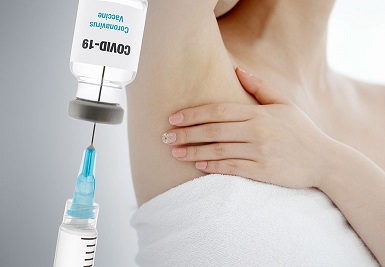WARNING! Qatar Study Shows That Lymphadenopathy Due To COVID-19 Jabs With Increased FDG Uptake May Falsely Be Blamed On Oncological Issues!
Source: Lymphadenopathy - COVID-19 Jabs Feb 09, 2022 3 years, 10 months, 1 week, 2 days, 6 hours, 16 minutes ago
A new study by researchers from Weill Cornell Medicine-Qatar has found that COVID-19 jabs can also induce Lymphadenopathy that is often mistaken as signs of possible oncological manifestations or disorders! (Note in the article we do not use the V word and it is replaced by the word jabs as certain algorithms on certain American social media platforms and search engines will block or shadow ban articles containing the V word as part of their control on the COVID-19 narratives!)

The study team cautioned that care must be taken before suspecting lymph node metastasis or deciding for lymphadenectomy for patients following COVID-19 jabs.
Lymphadenopathy refers to lymph nodes that are abnormal in size (e.g., greater than 1 cm) or consistency. Palpable supraclavicular, popliteal, and iliac nodes, and epitrochlear nodes greater than 5 mm, are considered abnormal.
One side effect that has been widely reported is post-COVID-19 jabs is lymphadenopathy.
https://pubmed.ncbi.nlm.nih.gov/33774684/
https://pubmed.ncbi.nlm.nih.gov/33378609/
https://pubmed.ncbi.nlm.nih.gov/33301246/
https://pubmed.ncbi.nlm.nih.gov/33707061/
https://pubmed.ncbi.nlm.nih.gov/33895650/
https://pubmed.ncbi.nlm.nih.gov/33782299/
The study team reports that due to the mimicry of the lymphadenopathy for metastases in some oncologic patients, there have been reports of patients who underwent biopsies that showed pathologic confirmation of benign reactive lymphadenopathy secondary to the COVID-19 jabs.
Hence, understanding the incidence of lymphadenopathy post-COVID-19 vaccinations will help guide radiologists and oncologists in their management of patients, both present oncologic patients, and patients with concerns over their newly presenting lymphadenopathy.
The
Lymphadenopathy-COVID-19-Jabs study team conducted a systematic literature search using several databases to identify relevant studies that reported lymphadenopathy post-COVID-19 jabs.
The study findings revealed that several cases have been detected in patients undergoing follow-up fluorodeoxyglucose (FDG)-positron emission tomography-computerized tomography scans where lymph nodes ipsilateral to the jab injection site show increased uptake of FDG.
Thus, knowledge of the incidence of lymphadenopathy may help avoid unnecessary biopsies, interventions, and changes in management for patients, especially oncologic patients who are at risk for malignancies.
The study findings were published in the peer reviewed Journal of Medical Virology.
https://onlinelibrary.wiley.com/doi/10.1002/jmv.27599
/>
Lymphadenopathy can be defined as any type of inconsistency or abnormality in lymph nodes. The abnormality can lay within the firmness, size, or number of lymph nodes in a particular section of the body.
Lymphadenopathies can result from a number of causes and can vary depending on the location, including bacterial, parasitic, and viral infections. Studies have shown that unilateral lymphadenopathy has been highly associated with jabs such as the influenza jabs, BCG jabs, and HPV jabs.
https://pubmed.ncbi.nlm.nih.gov/33874733/
Post jabs lymphadenopathy may be falsely attributed to oncological disorders in patients who are diagnosed with cancer, in remission, or those who are at high risk for developing malignancies. Therefore, it is necessary to be familiar with the possible post-COVID-19 jab lymphadenopathy to avoid unnecessary stressful diagnostic procedures including imaging and invasive biopsies.
This study review compiles data about the events of lymphadenopathy reported post-COVID-19 jabs and the recommendations to avoid any clinical and/or diagnostic complications.
The study findings signify that lymphadenopathy may occur following COVID-19 jabs.
A total of 6022 individuals developed lymphadenopathy post-COVID-19 jabs as reported by different types of studies including 24 case reports/series, 10 cohort studies, and 2 RCTs. Although some of the studies reported higher rates of lymphadenopathy in the COVID-19 jabbed groups compared to the control groups, one study established a significant association between Pfizer vaccination and lymphadenopathy (45.6%) compared with the unjabbed group (7.6%) (p value <0.01).
https://pubmed.ncbi.nlm.nih.gov/33774684/
Also, the rate of lymphadenopathy was significantly higher after the second dose as compared to the first dose. However, this cohort is not representative of the entire population as only patients with malignancies who may be more susceptible were included.
The study findings revealed that lymphadenopathy following COVID-19 jabs may be occurring more often than previously thought.
Fortunately, the majority of cases have been benign with no major adverse effects occurring as a result of the lymphadenopathy.
Hence, it is important to recognize that post jab lymphadenopathy may not pose significant harm to the jabbed individuals and is not a reason to withhold jabs.
However, lymph node enlargements following COVID-19 jabs is expected to be increasingly observed in the near future especially those that could be suspicious for malignancy during follow-up of tumor patients with imaging techniques.
It is, therefore, especially important to consider post jab lymphadenopathy in patients who undergo regular tests such as FDG-PET-CT or MRI as results may be misinterpreted.
Clinicians must be aware of such possible transient detection of hypermetabolic regional lymph nodes following COVID-19 jabs.
Many clinical researchers of the included studies recommend that jab information must be included in the medical history of patients who are being imaged.
Patients are encouraged to always communicate their jab history to their oncologist, radiologist, and other medical staff treating them.
Other recommendations specific to patients with any kind of malignancy include taking the jab shots on the arm contralateral from the limb with expected lymphatic drainage of the malignancy if possible.
This may help minimize the need for repeated imaging and more invasive procedures such as biopsies due to inconclusive scans. It is encouraged that imaging, such as mammography, should be carried out before or 4–12 weeks following jabs in line with the Society of Breast Imaging's recommendations.
https://vtmd.org/client_media/files/SBI_recommendations_for_managing_axillary_adenopathy_post_COVID_vaccination_003.pdf
It should also be noted that the lymphadenopathy may last for over 5 weeks after taking the jab. With that being said, it is important that patients get assessed by a doctor if they develop any lymphadenopathy after taking the COVID-19 jab especially if worrying features are present such as prolonged course, widespread lymphadenopathy, and/or signs of infection.
For more about
Lymphadenopathy-COVID-19-Jabs, keep on logging to Thailand Medical News.
